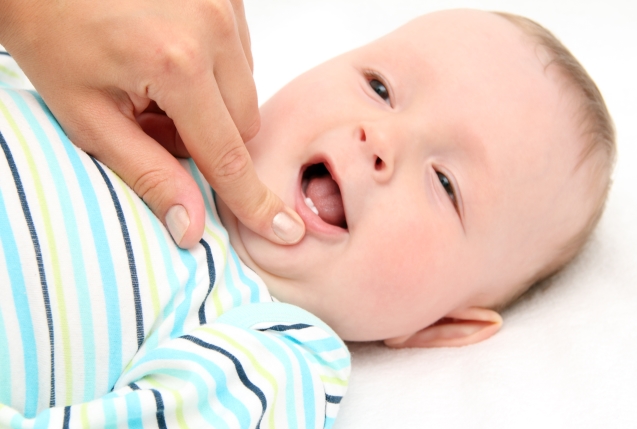You’ve been enjoying your baby’s “tooth-less” smiles for a few months and now there are some tiny little white teeth sprouting. That means it’s time to take care of baby’s first set of teeth, a vital step in the long-term health of your child’s permanent teeth.
It’s important to work toward healthy dental habits from when your baby’s first tooth appears. Starting early with wiping the first erupting tooth with a wet washcloth / finger toothbrush helps to baby adjust to this healthy habit. Sometimes it seems that babies / toddlers don’t want their teeth cleaned, but it’s extremely important to continue working toward thorough brushing and it will get better as you stay consistent and with time. By the time your child is 3 years old all 20 baby teeth will already be in!
And even though baby teeth are temporary, they’re still susceptible to cavities. Unfortunately dental cavities are common: 25% of 2-4 year olds in the U.S. have had a cavity. Fortunately, baby cavities are largely preventable with proactive care.
Here are a few tips for keeping your child’s gums and teeth healthy:
- Begin to gently brush baby’s teeth when the first tooth appears, twice a day – in the morning and after dinner or the last bottle before bed. You should use a “grain of rice sized” amount of fluoridated toothpaste. When your baby turns 3 years old, then you should increase to a pea-sized amount of fluoridated toothpaste.
- Avoid putting baby to bed with a bottle. Commonly referred to as baby bottle tooth decay, this can happen when sweetened liquid such as juice, milk or formula stay in the mouth for a long period of time, especially right before bedtime. Tooth decay can occur when baby is put to bed with a bottle, or when a bottle is used as a pacifier. The sugars in the drink are metabolized by bacteria in the mouth, which leads to the production of acid that can eat away the enamel of the teeth, often resulting in cavities.
- Do not share things that have been in an adult’s mouth with your baby. Babies initially do not have cavity-causing bacteria in their mouth. However by cleaning a pacifier in a parent’s mouth, or feeding parent and baby from the same spoon or fork can introduce these bacteria to baby early.
- Sugary foods and sugary drinks are a tooth’s worst enemy. Try to establish good eating habits to promote oral health, as well as overall wellness. Avoid sticky foods e.g. dried fruits, gummies, “fruit snacks,” etc. as they adhere to the tooth and increase risk for cavity.
Starting good oral hygiene early on can help keep your baby’s smile healthy for life.



